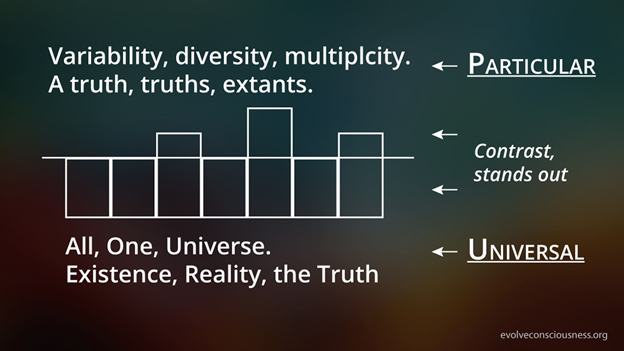Yesterday I posted about looking at what truth is, getting at defining it and how it's used as a word. This post will carry on from there and look at two generalized categorizations for how the word truth is used.
I had mentioned how truth as a general concept is a synonym for the universe, reality and existence. The etymology of truth and other words and the symbolism they evoke cohesively tie together to form an understanding of what truth is.
Recall the main terms used in the etymology? Firm, solid, steadfast, like a tree, upright an how parts of existence stand out in contrast to each other in alignment with the law of identity. This graphic helps to visualize that and moves us into the post for today.

There are two overarching types or ways to use the word truth: as a universal (Truth) and as a particular (truth/truths).
The universal type of truth is “the Truth” itself; the "One"; the "All". It’s a synonym for reality, existence and the universe. They represent a universal grouping concept referring to all of everything as one thing. The universe is uni-verse, that which is rolled or turned into one. The concept of universal truth represents everything as “one”, just as existence, reality and the universe do. It’s everything that was, is or will be.
The particular type of truth refers to the variability, diversity and multiplicity of particular aspects of reality, existence of the universe. The many extants or truths, where you can identify one extant or truth from another. Particular truths are a subset and part of the universal truth. If you know of and understand philosophical metaphysics, then you can understand how there are the particular colors blue, red and green that are part of the universal grouping concept called colors. To speak of the generality of numbers is a universal concept, while 1, 2, 3, etc. are particular numbers. There are also universal truths (not the universal Truth) which are particular truths that apply universally; 1+1=2.
A truth is a particular aspect of reality that exists. “The Truth” itself, is a construct to represent everything in existence (all of the particular extants). "The Truth" does not exist in and of itself. The universe doesn’t exist in and of itself. These are abstractions. The Truth exists as an amalgamation of all truths. Things that exist (truths) express a particular aspect of the universal all-encompassing Truth as the concept; through being extant they exist as “a truth”.
The Latin for true is verus, and truth is veritas. This is where we get words that represent truth like veracity, veracious, verify and verifiable. There is veracity behind a truth, because it is verifiable. A truth is verifiable, “solid”, as in real and demonstrable, not unreal and indemonstrably imaginary. Truth is not simply belief as “truth” that you imagine in the subjective inner-light constructs of your consciousness. Truth is objective, not a subjective matter of opinion. Truth is a symbol and concept to represent what is existent, as opposed to unreal non-existent imaginations and beliefs we can invent.
If something can’t be verified, repeated or persisted through a methodology, then it can’t be confirmed through verification to exist. Although it may be true to have existed or occurred, such as an event. Having seen the event, one can make a claim of truth about what did happen. But without a way to verify it, others can only believe that claim. They can’t know it to be true. They can’t use the word “true” or “truth” to refer to it. They can believe something occurred, but not know the truth that it did occur. Accepting a claim of truth, to believe it, yet refer to it as truth, is why there are many false claims of truth and why the word is misused.
The objective universe, with all that it contains, anything that is, is real and exists, as part of reality and existence, even if we can’t interact with it. You can’t interact with the abstraction of numbers, but they exist. One tree is not two trees. Numbers are represented in reality. To actually know something as a truth requires it to have been demonstrated as such. If you cannot re-demonstrate it to others, then they can only believe what was demonstrated to you. They can’t properly use the word symbol “truth” to refer to it since it’s not a demonstrable truth to them. Imagery in consciousness (phantasms, beliefs) does not equate to existence in reality. If you can’t verify what someone says about reality, then you believe them, you have trust, loyalty and faith in that belief being true, but you can’t truthfully say it’s true yourself.
"It’s everything that was, is or will be."
That is also the definition for the word Cosmos.
ENGAGEtokens.!ENGAGE 25
Indeed, cosmos is another synonym for the universe, everything ;)